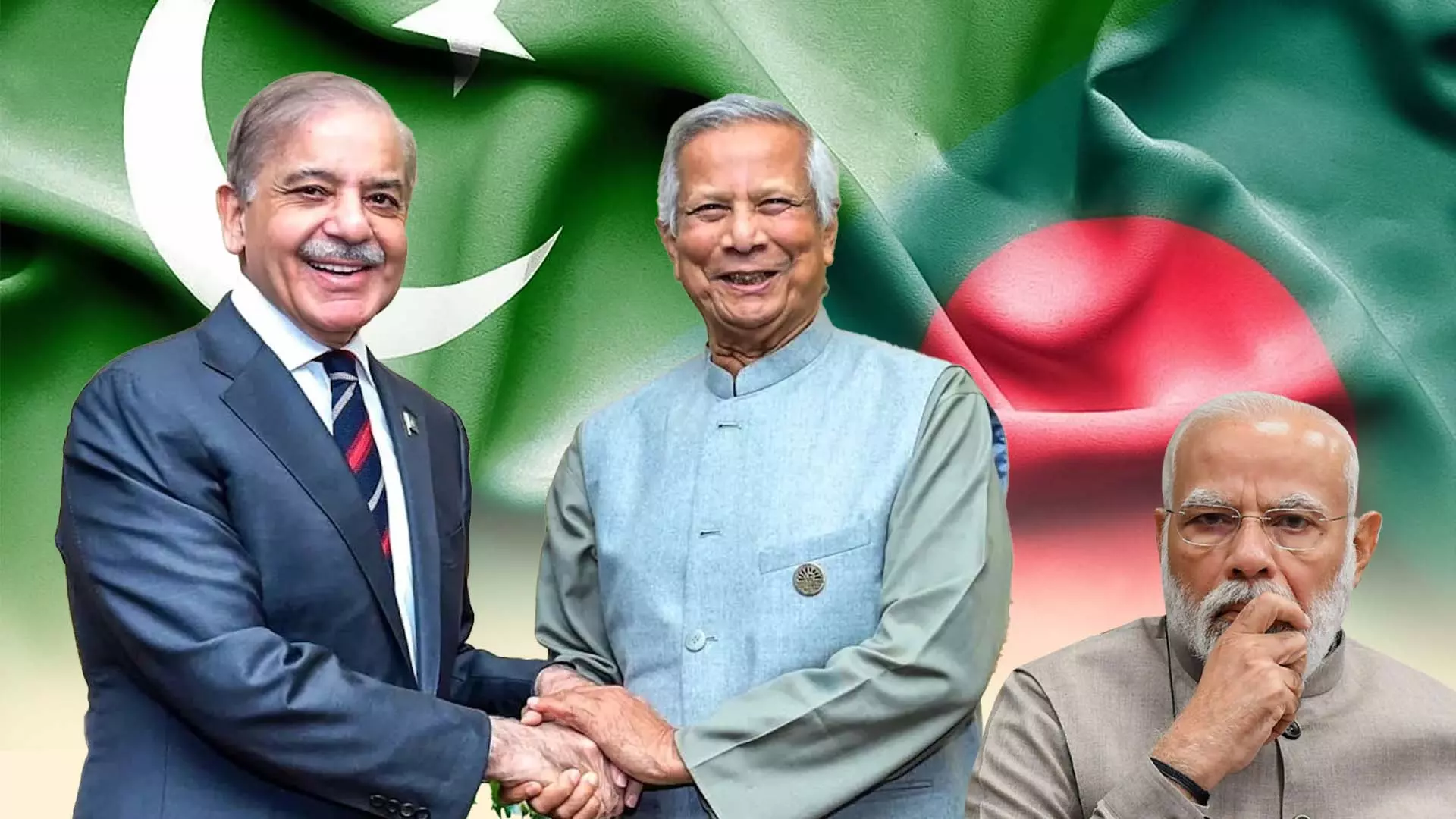
Pakistan-Bangladesh axis emerges as India falls out of Dhaka's favour
A fast-growing Bangladesh-Pakistan-China-Turkey axis is reshaping South Asia after Sheikh Hasina’s exit. Can India still influence Dhaka?

India is unlikely to repatriate former Bangladesh Prime Minister Sheikh Hasina anytime soon, but the shifting political equations in Dhaka are already reshaping South Asia’s strategic landscape. As Bangladesh’s relations with Pakistan expand rapidly, India’s once-steady partnership with Dhaka is under increasing strain.
In this week’s Worldly-Wise episode, The Federal's KS Dakshina Murthy examines how Dhaka–Islamabad proximity, paired with China and Turkey’s growing presence, could pose major challenges for New Delhi.
New alignments
Since Sheikh Hasina’s ouster in August last year, ties between Pakistan and Bangladesh have strengthened more quickly than at any time since 1971. Parallel to this, New Delhi’s once-robust partnership with Dhaka is beginning to fray, with political messaging and trade decisions signalling drift.
Also read: Sheikh Hasina death sentence: Can India refuse extradition? What treaty says
Adding to the complexity, China and Pakistan’s “all-weather” partnership now extends into Bangladesh’s trade, infrastructure and defence sectors. Turkey, which has deepened its strategic cooperation with Pakistan in recent years, is also visibly expanding its engagement with Bangladesh.
China–Pakistan–Bangladesh–Turkey axis?
The emergence of a loose four-nation alignment — Pakistan, Bangladesh, China and Turkey — has raised alarm in Indian strategic circles. While only Pakistan remains openly hostile to India, the other three maintain cordial diplomatic positions, a stance that could shift quickly during a crisis.
The May 2025 India–Pakistan conflict demonstrated this risk. Both China and Turkey openly supported Pakistan by providing military equipment, and extended technical and strategic assistance detrimental to India’s interests.
Can Hasina’s return change anything?
A key question remains whether sending Sheikh Hasina back to Dhaka could reverse the diplomatic chill. Analysts argue it might ease tensions, but the deeper trends are unlikely to change.
Also read: Sheikh Hasina's extradition: Why is India in a tricky situation?
This is because the uprising that forced Hasina out was led by right-wing Islamic conservative groups, many with known anti-India positions. These include the Jamaat-e-Islami, the National Citizens Party formed during the agitation, and factions of the Bangladesh Nationalist Party (BNP). Some of these groups opposed Bangladesh’s 1971 liberation and view Pakistan more favourably than India.
Deepening Dhaka-Islamabad cooperation
Over the past year, top leaders from both countries — including Bangladesh’s Chief Advisor Mohammad Yunus and Pakistan’s Prime Minister Shehbaz Sharif — have met at least three times.
In October, Bangladesh’s foreign affairs advisor Tauhid Hussain held talks with Pakistan’s envoy Imran Haider, where they agreed to revive the long-defunct Joint Economic Commission.
Also read: Hasina’s death sentence pushes Bangladesh to brink of civil war
In August, Pakistan’s Deputy Prime Minister Ishaq Dar visited Dhaka. During this visit, a visa-free travel arrangement for diplomatic and official passport holders was signed. Pakistan also announced 500 scholarships for Bangladeshi students and offered to train senior bureaucrats — moves that could influence Bangladesh’s future administrative elite in Islamabad’s favour.
Cultural, economic and defence push
Pakistani artists such as Talha Anjum, Ali Azmat and Imay Bhai have performed in Dhaka to packed audiences, signalling a new cultural warmth.
Trade between Bangladesh and Pakistan grew by 27 per cent in the five months following Hasina’s ouster. Cargo vessels carrying essential commodities from Pakistan have docked at Chittagong for the first time since 1971.
Military cooperation has also accelerated. Senior defence leadership from both countries met earlier this year to formalise joint exercises, training exchanges and weapons trade. Bangladesh is reportedly assessing Pakistan–China’s jointly developed JF-17 fighter aircraft under its Forces Goal 2030 modernisation plan.
India-Bangladesh ties cool sharply
India and Bangladesh have simultaneously downgraded engagement. In August, India restricted jute imports from Bangladesh. Previously, India accounted for nearly USD 96 million in annual imports. Following the restrictions, Bangladesh’s jute export earnings fell dramatically — from USD 13 million in July last year to about USD 3.5 million this year.
Bangladesh retaliated by halting yarn imports from India across several land routes.
A major power purchase agreement, signed during Hasina’s tenure, is now being reviewed and is under court-mandated investigation in Bangladesh.
A turning point for South Asia?
India-Bangladesh relations have historically faced ups and downs, with the Hasina era being the most stable period. Today, a new geopolitical pattern is emerging, involving deeper Bangladesh-Pakistan cooperation backed by China and Turkey.
This evolving axis has the potential to reshape South Asian power equations — and not to India’s advantage.
As regional alignments shift, New Delhi may need a recalibrated approach to retain influence in its immediate neighbourhood.
(The content above has been transcribed from video using a fine-tuned AI model. To ensure accuracy, quality, and editorial integrity, we employ a Human-In-The-Loop (HITL) process. While AI assists in creating the initial draft, our experienced editorial team carefully reviews, edits, and refines the content before publication. At The Federal, we combine the efficiency of AI with the expertise of human editors to deliver reliable and insightful journalism.)

